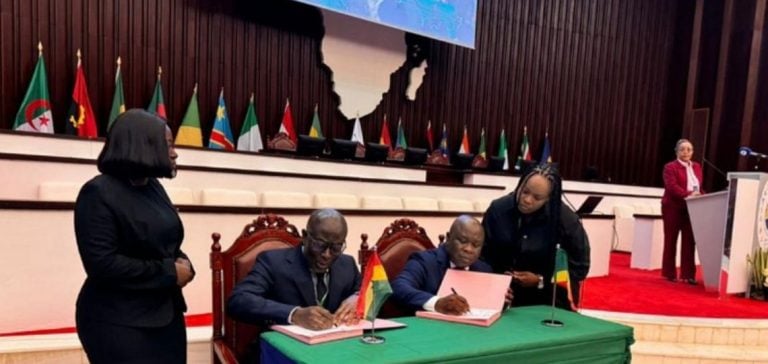Société Nationale des Pétroles du Congo (SNPC) and Ghana National Petroleum Corporation (GNPC) recently signed a strategic cooperation agreement at the meeting of the CEOs of the oil companies of the African Petroleum Producers Organization (APPO) in Malabo, Equatorial Guinea.
The agreement aims to strengthen relations between the two national oil companies, particularly in the sharing of technical skills and expertise, and in the implementation of transnational projects.
The focus is on improving energy infrastructures and the energy transition in a sector where global competition and economic constraints demand rapid adaptation. The MoU provides for increased cooperation between SNPC and GNPC in several key areas, including oil and gas resource management, as well as energy infrastructure projects.
These initiatives are designed to better meet Africa’s growing energy needs, while diversifying both countries’ resources.
The aim is not only to improve production capacity, but also to optimize existing infrastructure to better connect regional and international markets.
Infrastructures and transnational projects
One of the flagship projects discussed under this agreement concerns the development of an oil pipeline linking Pointe-Noire to Malakou, a project in partnership with Russia.
This pipeline, which crosses several strategic regions, is intended to facilitate the transport of Congo’s oil to external markets, while increasing export capacity.
In a recent decree, Russia approved the project, which is expected to strengthen Congo’s energy infrastructure while improving access to regional oil resources.
The agreement between SNPC and GNPC could also play a key role in the development of other similar cross-border projects.
The development of these infrastructures could encourage other African companies to follow the same model of regional cooperation, thus facilitating the integration of energy markets in West and Central Africa.
Energy transition and diversification
One of the priorities of this agreement is the implementation of projects linked to the energy transition.
SNPC and GNPC are committed to working on initiatives aimed at reducing greenhouse gas emissions and optimizing the use of available energy resources, particularly natural gas.
These projects are part of broader efforts by both companies to adapt to the new demands of the global market, while meeting the decarbonization expectations of their respective governments.
Africa’s national oil companies, although heavily dependent on hydrocarbons, are seeking to diversify their activities to minimize the risks associated with volatile international markets.
By investing in gas upgrading projects and developing more sustainable infrastructure, SNPC and GNPC are striving to secure a more stable energy future while maintaining their global market share.
Regional leadership and governance
The meeting of African oil company CEOs was also marked by the handover of the presidency of the APPO CEO Forum.
Mr. Maixent Raoul Ominga, Managing Director of SNPC, handed over the presidency to Ms. Teresa Isabel Nnang Avomo, Managing Director of GEPetrol, the national oil company of Equatorial Guinea.
This change at the head of the organization underlines the importance of coherent governance to support regional cooperation efforts.
Mr. Ominga’s presidency was marked by discussions on transnational projects, and he actively promoted greater collaboration between African companies.
The APPO CEO Forum remains a crucial platform for strengthening ties between national oil companies and developing regional strategies.
Mrs. Avomo, on taking over, confirmed her commitment to continuing these efforts by promoting regional projects and supporting initiatives to strengthen energy infrastructures.
Potential impact on the African oil sector
This agreement between SNPC and GNPC could have positive repercussions beyond the borders of Congo and Ghana.
It is part of a drive to strengthen the regional integration of African energy resources, while attracting international investment.
Current projects, such as the Pointe-Noire – Malakou pipeline, illustrate this ambition to better connect African countries to meet global energy challenges.
The role of the African Energy Bank (AEB) is also central to this dynamic.
This institution, financially backed by SNPC and other African oil companies, is designed to catalyze strategic investment in large-scale projects, particularly those related to oil infrastructure.
Financing needs for projects such as the pipeline and other cross-border initiatives are critical, and AEB is positioning itself as a major player in securing these funds.






















